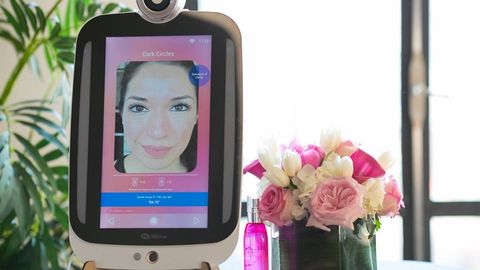TechRadar Verdict
HiMirror Plus+ is a smart mirror with unique features and a lot of potential. However, it's let down by its high price point, frustrating controls and sluggish software.
Pros
- +
Looks good
- +
Ambient lighting is useful
- +
Personalised skincare tips
- +
Multiple control methods
Cons
- -
Expensive
- -
Frustrating gesture controls
- -
Slow software
- -
Short power cord
Why you can trust TechRadar
This morning our mirror told us that we have 11 wrinkles, 15 fine lines, three red spots and if our pores are anything to go by, we might very well be made of Swiss cheese. Okay, we added that last part. But our pores are wide and plentiful. The opposite of what we’d like them to be.
Unless you own a HiMirror, your morning probably wasn't filled with quite as much brutal honesty as ours. HiMirror is a smart mirror, which acts as a beauty tool, a media streaming device and a personal skincare assistant.
There are two models of HiMirror available in the UK: HiMirror Classic and HiMirror Plus+. The model we tested was the HiMirror Plus+, which is distinguished by its ability to support six users rather than four and store 14,000 photos rather than 2,000. It also has LED lights for an ambient lighting feature, as well as twice the number of transmitting and receiving antennas, which improves the quality of its Wi-Fi connection.
Design
First things first, the HiMirror Plus+ is a good looking piece of tech that you wouldn’t be ashamed to have in your home. It sits at 17 inches tall and has a minimalist design that’s reminiscent of products from Apple. The only interruption to HiMirror’s sleek silhouette is the large cyclopean camera on its top. A camera which, for those concerned with privacy, can be opened and closed as you need.
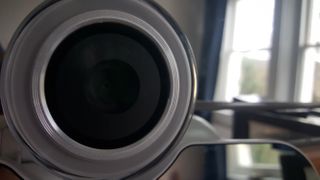
HiMirror's body is kitted out with lights. The first and brightest of these is around the camera. Each side of the mirror’s body also has a strip of LED lights which can be adjusted to simulate different environments. These lights alone aren’t sufficient to use the mirror and you will need some natural or artificial light to supplement them. They’re more useful for seeing what your makeup and skin will look like in different lighting scenarios rather than being lights in and of themselves.
On the far right hand side of the mirror, to the right of the LED light, you’ll also find some touch-sensitive buttons which allow you to quickly move between the mirror’s different modes and adjust its settings without having to navigate through any menus. You’ll use the second button down to switch between mirror mode and zoom mode.
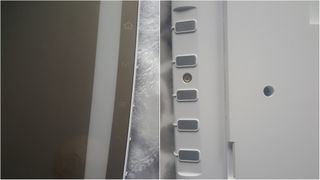
Though these buttons may look like they’re on the mirror face, don’t be deceived – the symbol is there but the part you actually want to touch is to the right on the rear edge of the mirror. Again, no risk of smudging.
HiMirror will come with the tools required to install it on a wall or another mirror. A couple of things should be pointed out, though. The first is that the mirror’s power cord is quite short so try to install it somewhere with a plug socket nearby. The second is that at five and a half pounds it’s quite heavy, so be sure to hang it or sit it somewhere that’s able to support it.
Conveniently, though, it’s water resistant and fog proof so you’ll be able to use it in a bathroom without having to worry about shower steam.
Set up
Setting up the HiMirror Plus+ is a relatively straightforward process. When you turn the device on, it’ll prompt you to download the HiMirror companion app through the Apple app store or Google Play. When you access the app, it’ll invite you to set up an account where you’ll enter details about your age and skin type. You’ll also be prompted to enter your home Wi-Fi information, after which the app will generate a QR code.
Using HiMirror’s camera to scan this QR code will connect it to both your Wi-Fi network and the account you’ve set up on the app.
After this, the mirror will take you through setting up your voice commands and facial recognition and it’ll give you a tutorial on using the motion-controls.
You’ll also be given the option to connect the remote control which comes with the mirror if you’re not particularly taken with its gesture controls. Much more on why this may be the case later.
Skin analysis
One of HiMirror’s unique selling points is that it’s able to analyse your skin and give you feedback on its state. Once you’ve gone through the HiMirror’s initial set up process, the first thing it’ll do is perform your first skin assessment. Using the camera mounted atop the mirror, simply take a close up photo of your face and the mirror will do the rest of the work.
It’ll look at seven different common problems we have with our skin: wrinkles, fine lines, dark circles, dark spots, red spots, roughness, and pores. Once the mirror has analysed these areas, it’ll give you your results.
The results are presented in three ways: you'll receive a rating between 0 and 100 for each skincare category, as well as a rating for your overall skin health; you'll get a count of the number of red spots, dark spots, wrinkles, fine lines and pores that you have; and you'll be told the percentage of your face which these flaws take up.

On our first try, our skin health came in at 99, which we were pretty delighted with. But as we mentioned before, there were some problem areas.
The results are presented on the mirror in a kind of slide show but they can also be accessed through the app where you'll also be able to set skin goals and track your progress on the go.
The idea behind this function is that you’ll scan your skin once or twice a week and begin to track your results. Each time you analyse your face, your results will be compared to the last time you did it and you’ll be told whether things have deteriorated or improved.
Because the HiMirror is using photos rather than any kind of active sensor to scan your skin, we’d advise ensuring your skin is product free and you’re in roughly the same lighting at each assessment to ensure you’re tracking your skin accurately.
The first time we used the mirror, for example, we were wearing makeup, while the second time we were clean-skinned and fresh from a shower.
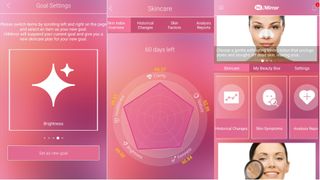
When scanning our face for the second time the mirror, it was able to identify that though our skin brightness had increased and we had one less wrinkle than it thought, we had more red spots, more pores (oh no) and our skin health was actually more of a 95 rather than a 99.
"Oh dear," HiMirror told us, "it seems skin condition has slipped back a bit." The blow was somewhat lessened by the follow up "It's alright, Emma, don't be discouraged."
From comparisons like these you should be able to see whether your current skincare routine and lifestyle are making your skin condition better or worse. This will, in turn, help you to identify which variables you should be adjusting. Skin roughness increasing? Perhaps consider exfoliating more or using a more potent moisturiser. Helpfully, your results can be accessed and tracked via the app and the mirror itself.
Based on your results and the skin goals you've set for yourself, the mirror will advise which kinds of products you may want to consider investing in. Our recommendation was to purchase products which help with pores.

Media streaming
As it’s connected to your Wi-Fi, the HiMirror Plus+ is capable of streaming both music and video.
We had hoped that it’d be possible to link up our YouTube account to the mirror so that we could watch makeup and skincare tutorials from users we follow. This isn't quite the case. Though HiMirror does use YouTube, the videos you're able to access have been curated. These aren’t bad at all - some of them proved to be useful and - but they don’t offer the personalised experience we'd hope for from the media streaming function.
HiMirror’s video tutorials can be accessed via the media streaming section of the menu and they’re split into different categories: fitness and skincare. Both categories contain instructional videos with advice for users.
Spotify is the only music streaming service supported at the moment and you can connect your account via the HiMirror app. While it’s a nice addition, our homes already dozens of devices capable of streaming music on demand at a higher level of sound quality, especially homes with smart speakers. For that reason, we weren't particularly inclined to use the HiMirror Plus+ for Spotify.
When you’re streaming media, though, you don’t have to worry about anything cutting out; HiMirror’s Wi-Fi connection is consistent and strong.
As well as media streaming, the HiMirror is also able to display the weather in your location as well as humidity levels, UV levels and the temperature. This is useful information to be able to integrate into a morning routine as all of this information can affect which skincare and makeup products you use. The mirror will also give routine recommendations based on this information.
Product scanning
Product scanning is a HiMirror feature which has potential but just isn’t quite there. If you’re up to the challenge, you can use the HiMirror app to scan the barcode of every product you use on your skin so that the mirror can store it in a digital Beauty Box. Once a product has been placed in the Beauty Box, you’ll be able to get information about it and keep track of everything you own via the mirror itself or the companion app.
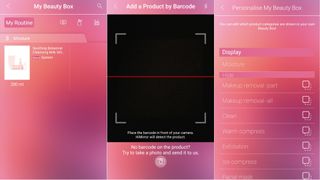
With its knowledge of your current skin condition, your skin goals and, now, the products you have to hand, HiMirror can recommend which products you may want to use in your routine and track their effectiveness. This is a useful feature for someone with too many products and little structure in their skincare routine. That said, we found the process of scanning everything we owned rather time consuming. Particularly as many of the products we attempted to scan either didn’t have barcodes or couldn’t be recognised by the HiMirror app.
Ambient lighting
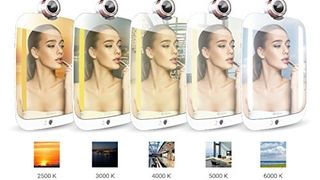
While the ambient lighting feature on HiMirror Plus+ seems like a small thing, it’s genuinely useful.
To access ambient lighting, you have to place the mirror into mirror mode, then use the touch-sensitive up and down buttons to bring up a menu of options. There are six lighting modes to choose from: bright office room, shopping mall or supermarket, restaurant or party room, sunset view, outdoor in sunny days, and off. As you scroll through the different environments, the LED lights which run down either side of the HiMirror adjust their tone and brightness to suit.
Though there’s no denying these make for some great selfie opportunities – and we’ve honestly considered strapping the mirror to my front so that I can live perpetually in the light of a sunset – this mode is also very useful for applying makeup for different occasions.
We’ve especially found it useful on the recent dull winter mornings to be able to brighten up our faces with some outdoor or office light to make sure our makeup is applied to suit those locations, rather than a dull bedroom at six o’clock on a dreary winter morning.
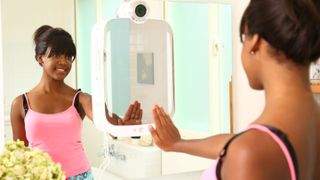
Different control methods
As it looks like a giant tablet, our first instinct was to paw HiMirror’s screen to make it work but it’s not a touchscreen.
Instead, you’ll be able to unlock and use HiMirror using your voice, hand gestures or the remote control that comes with it. This makes a lot of sense – if your hands are covered in product, you’ll hardly want to have to smudge up the surface of the mirror every time you use it.
The gesture controls recognise left, right, up and down swiping motions to navigate menus, while a pushing gesture is registered as select. Although this control method is a good idea, we did find it rather difficult to operate at times. The mirror's tutorial is very clear on how to use gesture controls but we tended to find it swung wildly between overly responsive and not responsive enough.
Part of the problem here may be that the mirror’s software can run somewhat slow which can be very frustrating. Sometimes you’ll find that the gesture you made was registered but it just took the screen a while to catch up, by which time you’ve waved your hand wildly to the right three additional times and somehow managed to change the language from English to Dutch.
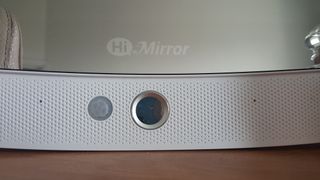
Voice control, on the other hand, is easier on the nerves. With the command "HiMirror, listen" you can do all the things gesture control does using your voice. If, like us, you find yourself at a loss for what to actually say to make the mirror do what you want, there are a list of commands on the product website.
By far the easiest control method is the remote. You will have to use gesture or voice controls to get to the settings menu where you can connect the remote, but once you've done so using the HiMirror is as simple as pressing some buttons.

Mirror mode and zoom mode
As we mentioned before, using the touch sensitive button on the right hand side of the mirror will allow you to move between different modes. One tap of the button will turn off the mirror’s screen and allow you to use it as an ordinary mirror. Another tap will take you into zoom mode. This turns on the overhead camera and gives you a closer look at your face. With each tap you’ll be able to zoom in up to three times closer.
Zoom mode is a nifty little feature as it allows you to get a closer look at your face without buying an any additional magnifying mirrors. We found it particularly useful for when we were neatening up our eyebrows or focusing on achieving the perfect eyeliner flick.
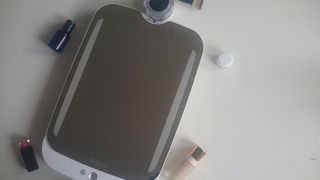
In mirror mode, HiMirror just becomes an ordinary mirror and it performs this function well. We were somewhat disappointed, however, that it was quite so ordinary.
It feels like something of a missed opportunity that HiMirror is either a mirror or screen and doesn’t really give you the option to be a mix of both. It’d be nice, for example, to be able to reserve a portion of its surface for videos you’re watching, or the news bulletins it can provide, while you’re using the mirror at the same time. For this reason we found that we preferred to have a second mirror nearby while using HiMirror so that we could use it in this way.
Price and availability
In the UK, the HiMirror Plus+ can be purchased in London's Selfridges store and on EBuyer for £319. HiMirror is also available on US shores, but the product range and features are slightly different. The US equivalent of the HiMirror Plus+ is called the HiMirror Plus and can be purchased for $219 on the official eShop.
We liked
Though it's somewhat bulky, HiMirror Plus+ is a good looking device that would sit nicely in any home. Its skin analysis function is unique and interesting and we enjoyed receiving personalized skincare tips. The ambient lighting and zoom features are useful additions that we enjoyed integrating into our morning routine, and though we found scanning individual products arduous, we can absolutely see the benefits of the Beauty Box feature.
We disliked
HiMirror Plus+ can be a frustrating product at times. Its gesture controls can be unwieldy, and the software in the mirror and the app can be slow at times. In addition to this, its short cord means you're limited where you can install it. Perhaps most frustrating, however, was the feeling that you had to choose whether you were using it as a mirror or as a smart device.
Rather than integrating with the rest of the smart home via another voice assistant, HiMirror Plus+ tries to do it all which leaves it feeling limited and overburdened.
Final verdict
HiMirror Plus+ is a product with a great deal of potential but unless you're heavily invested in your skincare routine, we're not sure it justifies its £319 price point. The ambient lighting and skin analysis are unique and useful features that we enjoyed using. However, the media streaming is something that can be done better with more personalization by other devices such as a smart speaker, a Chromecast or a smartphone. It also feels like a smart product that doesn't quite know how to integrate itself into the smart home - it's very much its own device.
Given that HiMirror appear to be refining and improving the product at a rapid rate - as we understand it, newer models have recently been released with an augmented reality makeup feature and makeup tutorials - we think this is one to watch for now.
Emma Boyle is TechRadar’s ex-Gaming Editor, and is now a content developer and freelance journalist. She has written for magazines and websites including T3, Stuff and The Independent. Emma currently works as a Content Developer in Edinburgh.
